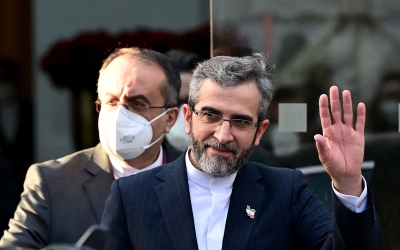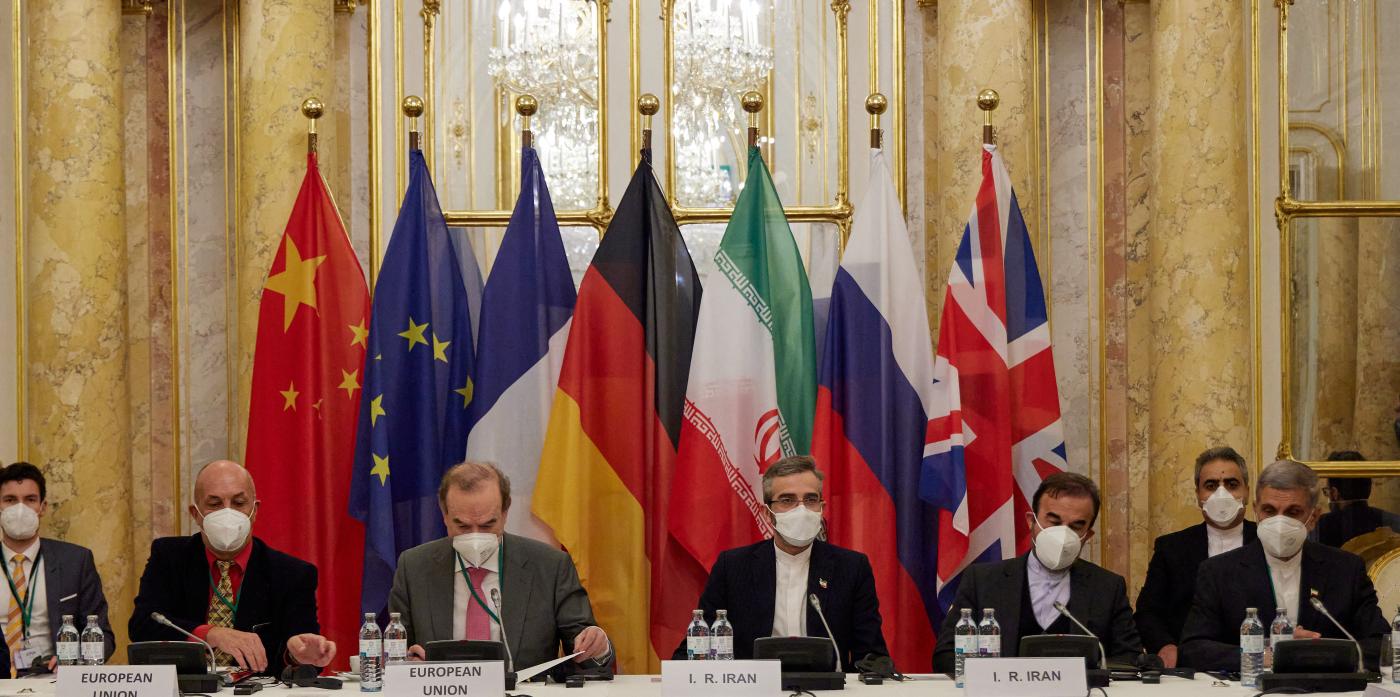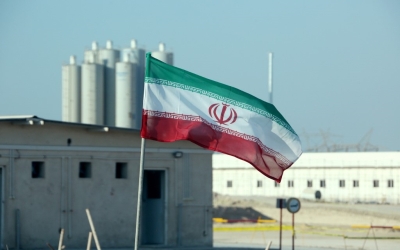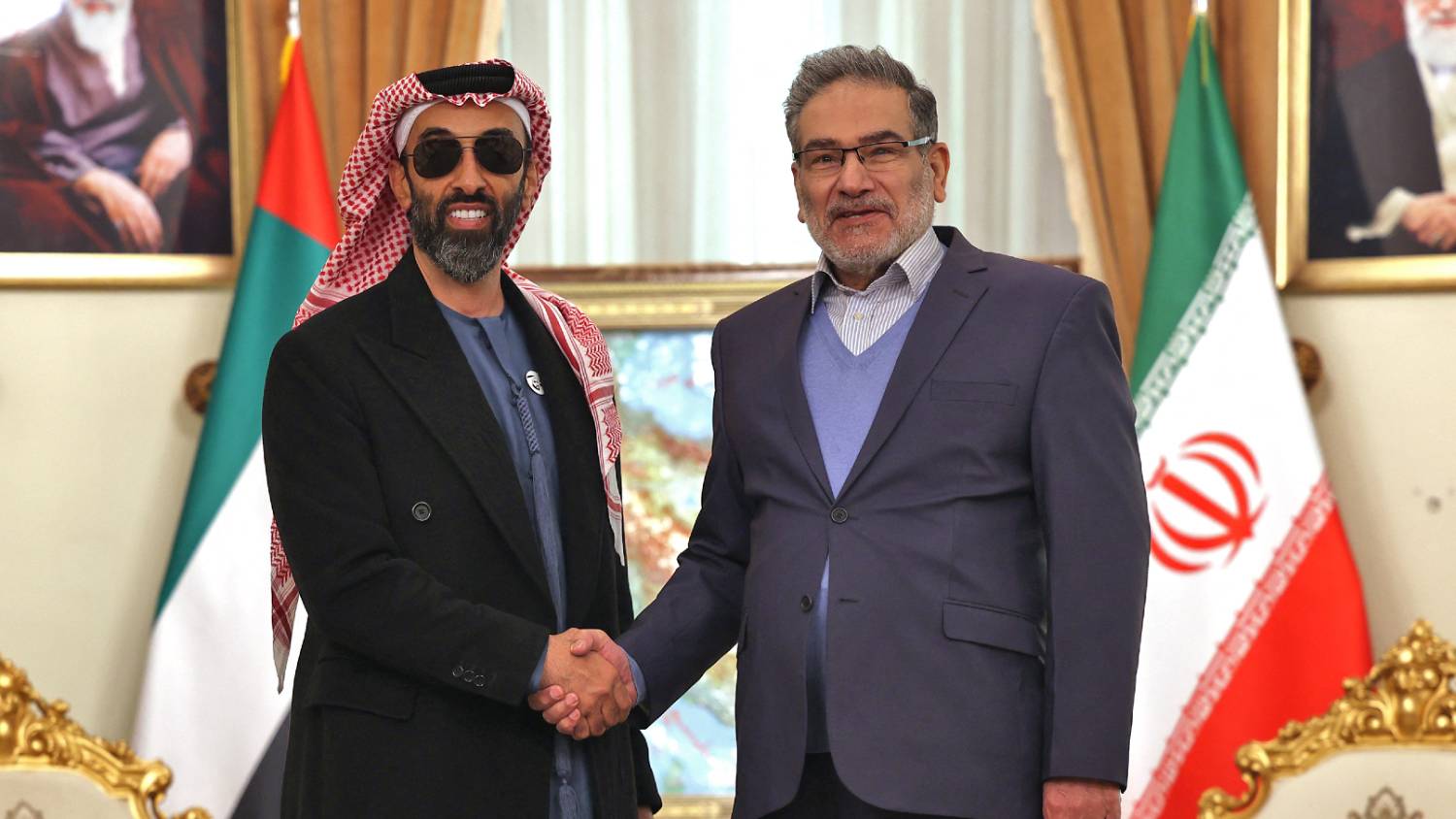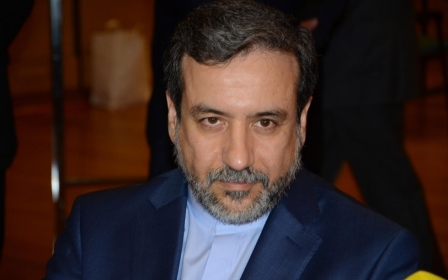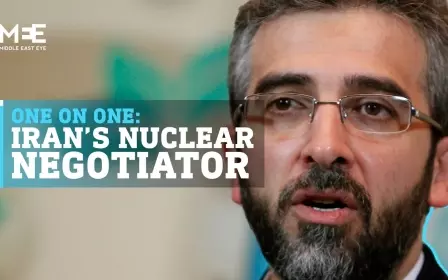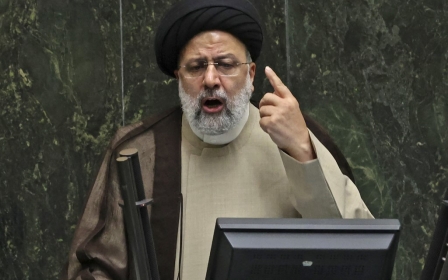US will get three conflicts for the price of one if it allows Israel to attack Iran
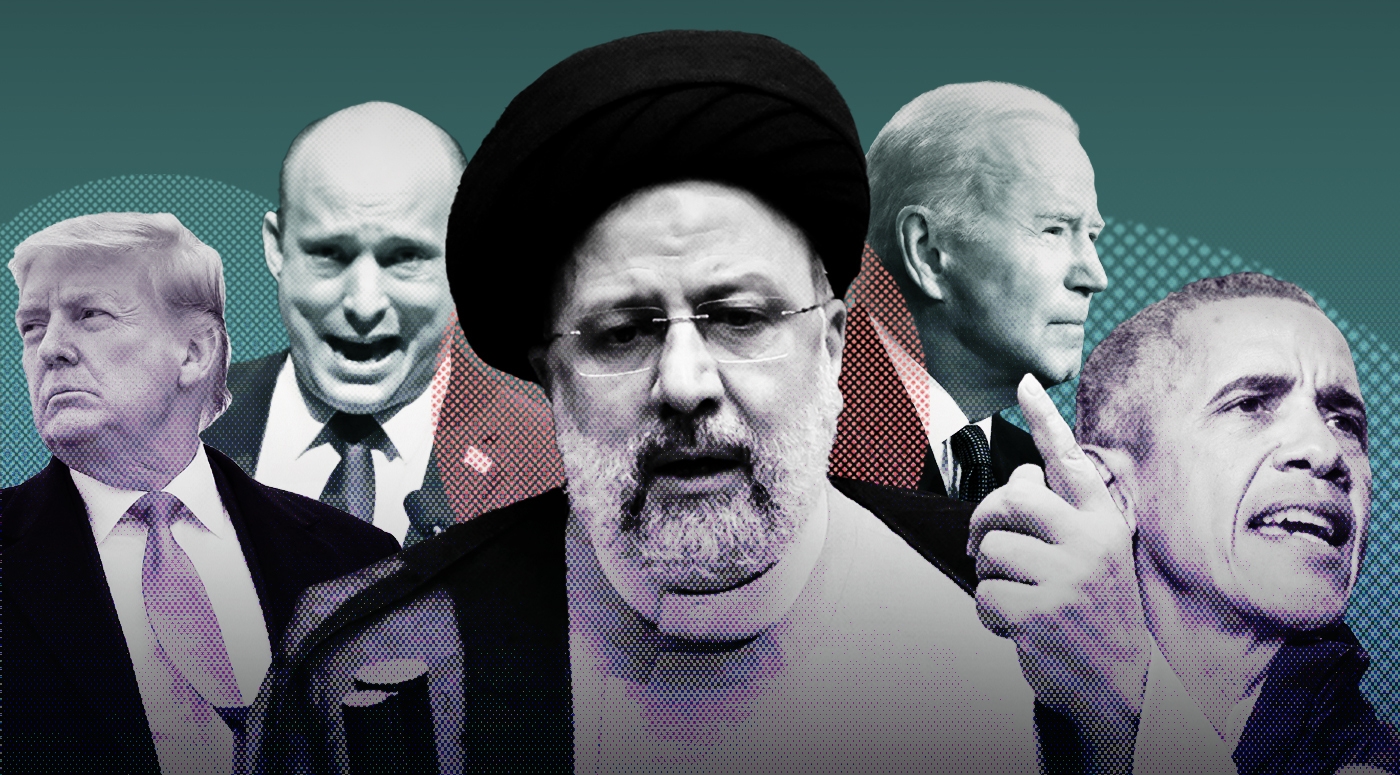
The talks in Vienna aimed at reviving the Iran nuclear deal, from which former US president Donald Trump withdrew in 2018, have reached a critical phase.
They are already into their eighth round and the gaps between the negotiating parties are showing no signs of narrowing. Iran's European interlocutors - the US delegation remains in a hotel across the road - want a quick deal based on a partial lifting of sanctions, a freeze on enrichment, and a full return of inspection by the International Atomic Energy Agency (IAEA).
The plain fact of the matter is that European and US diplomats in Vienna have lost their leverage over Iran
The Iranians want a full return to the deal they struck in 2015, all sanctions imposed on them lifted, a guarantee that the US could not walk away from the deal in the future, and a system of verification.
Of these, the most difficult to achieve is verification. The lack of a system of verification was, in the view of the current Iranian government, the main failing of the original deal. It allowed the US administration under president Barack Obama to continue sanctions.
Donald Trump,
New MEE newsletter: Jerusalem Dispatch
Sign up to get the latest insights and analysis on
Israel-Palestine, alongside Turkey Unpacked and other MEE newsletters
Two big sticks
The Europeans - Britain, France, Germany and the EU - are waving what they imagine to be two big sticks should the talks collapse. The first is a return to United Nations sanctions, because not only would the talks have collapsed, but the Joint Comprehensive Plan of Action (JCPOA) would go too.
The second is "Plan B" - or the threat of air strikes carried out by Israel with US backing.
The sanctions prescribed by the UN are weaker, more limited in scope and already implemented within the framework of the sanctions imposed by Trump.
The UN would not represent a pressure point for Iran. On the other hand, the collapse of the JCPOA would mean the expulsion of the IAEA nuclear inspection teams from Iran.
As things stand, Iran has suspended the IAEA's right under the JCPOA to mount intrusive inspections on nuclear facilities and took down four of its cameras at Karaj, where the uranium centrifuges are built, after the site was sabotaged by Israel in June last year. These cameras have now been reinstalled, but they are not transmitting to the IAEA.
The footage, which is being stored by Iran, must be handed over should the talks in Vienna succeed. Vital evidence about enrichment would be destroyed if the JCPOA collapses. And the international nuclear inspectors would become blind - once again - about Iran's nuclear enrichment programme.
What would be the benefit of that ?
Another war?
An Israeli air strike on Iran's nuclear facilities, and necessarily too on its command and control centres and air defence systems, would trigger the biggest regional conflagration since the invasion of Iraq in 2003. It would cause widespread civilian casualties, cripple oil production in the Gulf, and trigger pre-emptive air strikes in southern Lebanon and possibly also Gaza.
An Israeli air strike on Iran's nuclear facilities would trigger the biggest regional conflagration since the invasion of Iraq in 2003
Hundreds of missiles would be launched by Iran and its proxies at oil installations in the Gulf as well as at military targets in Israel. The threat of another war in the Middle East should never be taken lightly, because so much of the region is already on a hair trigger. But that said, I don't think the new administration of Ebrahim Raisi is bluffing when it says it is prepared for such a strike.
A cost-benefit analysis of a military strike makes sober reading for Israel’s hawks. Azerbaijan would not allow Israeli jets to use its airfields for a strike, although Israeli drones have used them for spying missions in Iran.
That leaves a direct strike from Israel itself.
Yossi Melman, an MEE contributor writing in Ha'aretz, makes the point that if even Israel's F35s - fully loaded and needing in-flight refuelling - make it over Jordanian and Iraqi airspace undetected, and that is a big if - they would have only one opportunity to mount a crippling strike on nuclear facilities, command centres and air defence systems.
Even if this mission were to be 100 percent successful, it is unlikely that it would deliver anything other than a temporary setback to Iran's uranium enrichment programme. Iran would "build back better," as they have done after each act of sabotage and/or assassination. This was the argument that the Biden administration made to Israel when the talks restarted.
The US said then that hitting Iran presents a tactical relief to Israel, not a strategic one, and the same would be even more true now. Furthermore, Iran's response would be framed as a legitimate retaliation for an act of war.
Although Tehran has never claimed responsibility for them, the Iranians have already shown, through drone and cruise missiles attacks on two Aramco plants and limpet mine attacks on oil tankers using Emirati ports in 2019, that the damage they could inflict on any Arab country that helped the attack against them would be considerable.
Suffice it to know that Saudi oil production was halved for weeks after the attack. And that is not counting what Iran's strategic missiles and Hezbollah's rocket arsenal could do to targets in Israel itself.
No one is more conscious of their vulnerability to their Gulf neighbour than the Emiratis and the Saudis themselves. Since the Iranian attacks on the Gulf, Abu Dhabi and Riyadh have been falling over themselves to be nice to Iran. Notably the UAE never formally blamed Iran for the attacks on tankers using its ports.
Since then, the UAE has signed a deal with Iran that would allow the Emiratis to open a trade route by land to Europe via Turkey, which would cut the time it took from 20 days to seven; and the mood music in Riyadh has also changed.
Gulf pragmatism
This week the Saudi foreign minister, Prince Faisal bin Farhan, said about Iran: "The Arabs extend their hands to the brothers in Iran if they respond to addressing Arab concerns that threaten the security and stability of the region, such as its support for terrorist militias and its pursuit of nuclear weapons."
Eyebrows were raised at the use of the word "brother".
The pragmatism Abu Dhabi and, to a lesser extent, Riyadh is showing in wanting to normalise relations with the axis of countries they had spent much of the last two decades trying to crush - Qatar, Turkey and Iran - has to a large extent dampened the hopes that Arab normalisation with Israel would create an active anti-Iranian axis, or an "Arab Nato".
One of the signs of this is the UAE's take-it-or-leave-it approach to the pipeline deal with Israel which would send oil from Eilat to Ashkelon. There are a number of reasons for this - not least the effect that such a deal would have on dampening traffic through the Suez Canal. But one of them is Abu Dhabi's growing relations with Iran.
And all this, before we even come to Biden.
Would any leader of a country shaken to the core by the Covid-19 pandemic, and still very much in crisis mode, willingly start a Middle East war which would have missiles flying all over the Gulf and the Levant? Would any US president, with his eye on a fragile economic recovery, tolerate the two- to threefold increase in the price of oil that would result?
The obvious answer to both is no. Iran is being threatened by cards it knows Washington is unlikely to play.
No cards to play
The plain fact of the matter is that European and US diplomats in Vienna have lost their leverage over Iran. They have subjected the country to the worst they can deliver, and Iran has not only survived but grown stronger. More sobering still to western hawks is the reaction that Russia and China would have to the collapse of the Vienna talks. This is the biggest difference between 2015 and today.
Both presidents Vladimir Putin and Xi Jinping have a host of other reasons not to play ball with Europe and America. Their relationship has deteriorated with Washington to the point where it becomes very difficult to cooperate on any issue.
Putin is demanding a fundamental retreat of Nato on its borders in Eastern Europe, and keeps 90,000 troops poised in mid-winter to invade Ukraine. Xi is determined to reunite Taiwan with the mainland. As the talks in Vienna have made amply clear, the Iranian delegation has the broad support of both powers.
All three disputes are becoming overtly linked.
It would take both a wise and confident US president to reverse course and act intelligently with Iran, Russia and China. Biden is neither
President Raisi will go to Moscow next month, and his foreign minister will travel to China. This - at least - opens the possibility that an attack on Iran would be responded to - in some way - by both Russia and China. Here again, Biden is issuing threats to Putin, such as cutting Russia off from the Swift banking system, should Ukraine be invaded, which would backfire on Western Europe. How would Germany pay for Russian gas, assuming they still receive it? By lugging suitcases full of dollars over the Polish border?
The real cards are with the Russian leader. Both he and Xi have it within their power to make life exceedingly difficult for western hawks. Far from taming Russia and China, the US is pushing them into each other's arms, and history tells us they are not natural allies. In 2015, the US was the acknowledged leader of the camp that pushed concessions on Iran. Now it is not.
"The problem is that the Europeans and Americans are playing a game of chicken, but they have no more leverage. If there were sanctions up their sleeves more than 'maximum pressure,' Trump would have already used them. They have run out of cards to play," an Iranian source in Vienna told MEE.
It would take both a wise and confident US president to reverse course and act intelligently with Iran, Russia and China. Biden is neither. The range of domestic challenges is simply too great for this administration, not least the possible return to power of its nemesis Trump in 2024.
Even if the US negotiating team in Vienna makes concessions on sanctions, it is doubtful these would get through Congress.
The Iranian insistence on guarantees and verification is real, not rhetorical. Unless a miracle happens in Vienna, the US will not be able to accept Iran's minimum requirements, and Iran will decide it can weather the consequences. As a result, a rare act of deconfliction which took five years to negotiate, the JCPOA, will die a natural death.
The bottom line is that all Raisi's team is demanding is what the US and the EU originally agreed to. If the Vienna talks fail and the JCPOA dies, neither former Iranian president Hassan Rouhani nor his successor, Raisi, would ultimately have killed this deal. But Obama, Trump and Biden would each have played their part.
The views expressed in this article belong to the author and do not necessarily reflect the editorial policy of Middle East Eye.
This article is available in French on Middle East Eye French edition.
Middle East Eye delivers independent and unrivalled coverage and analysis of the Middle East, North Africa and beyond. To learn more about republishing this content and the associated fees, please fill out this form. More about MEE can be found here.



